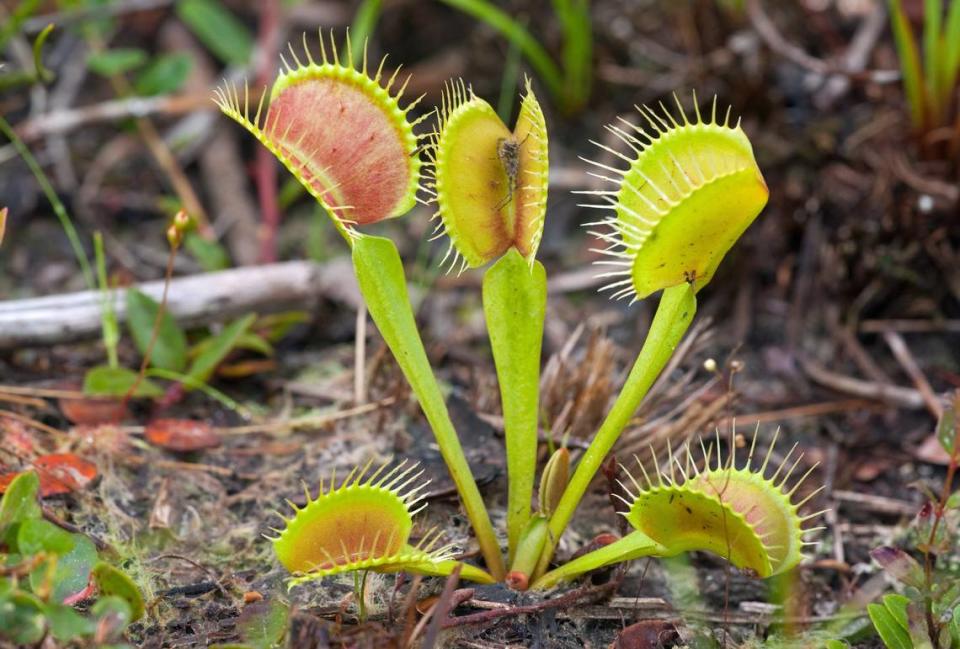NC car owners can finally get a license plate celebrating the ‘panda of the plant world’
After years of uncertainty and diplomacy, state lawmakers have approved a special license plate to honor the Venus flytrap, the state’s native carnivorous plant.
A provision creating the plate and another for the N.C. School of Science and Mathematics in Durham were included in a bill that Gov. Roy Cooper signed into law last week.
The governor’s signature was cause for both joy and relief for members of the N.C. Botanical Garden Foundation and Friends of Plant Conservation. Starting in 2019, they gathered 794 prepaid applications for a “Home of the Venus Flytrap” plate, then waited for the General Assembly to authorize the Division of Motor Vehicles to make the plate available.
Lawmakers in the House unanimously approved the plate in 2021 and again last year. But the Senate never considered it. As the plate languished, the foundation kept the deposits of hundreds of people eager to show their love for North Carolina’s most famous plant, said director Damon Waitt, director of the N.C. Botanical Garden in Chapel Hill.
“People would ask me about it, and I’d say, ‘Well, it’s not quite dead but it’s mostly dead,’” Waitt said. “And then it would get some life.”
More than 100 NC specialty plates
The DMV offers more than 100 specialty license plates that allow people to show support for sports teams, universities, branches of the military and all sorts of places, activities and foods. Surfers, scuba divers, amateur radio operators, golfers, cyclists, hikers and Harley Davidson and gun owners can get their own North Carolina specialty license plates.
The plates cost $10 to $30 more than standard ones, with a portion going to the sponsoring non-profit organizations. The Venus flytrap plate will cost an extra $30 per year, with $20 of that going to the Botanical Garden Foundation for conservation and research.
The plate, designed by Durham artist and landscape designer Preston Montague, is also a tiny mobile billboard that will celebrate a state treasure, says Gail Perry, a member of the foundation’s board.
“The license plate will help educate the public about rare plants, North Carolina’s unique habitats, and how important it is to conserve them,” Perry wrote in an email. “Perhaps it will even support tourism to North Carolina.”

The flytrap, which digests insects and spiders it catches in its jaw-like leaves, grows in the wild only in the wetlands of southeast North Carolina and northeast South Carolina. They’re the “panda of the plant world,” Waitt says, but many North Carolinians aren’t aware of their special connection to the state.
“It’s like the most charismatic plant in the world that everybody knows,” he said. “But not everybody knows where it’s from.”
Opposition in the state Senate
Celebrating the Venus flytrap on a license plate would hardly seem controversial, as the unanimous support from members of the House shows.
But both times it was sent to the Senate, the bill went to the Rules Committee, where it sat untouched. Supporters of the bill came to understand that the committee’s chairman, Sen. Bill Rabon, a Republican from Southport, was not a fan of the state’s specialty license plate program.
But the Senate’s ambivalence went beyond Rabon. Pat Ryan, spokesman for Senate leader Phil Berger, said in 2021 that the Senate “generally opposes” specialty license plate bills, because they create “an administrative challenge” for the DMV.
“If people want to showcase their support for a particular cause, they can buy a bumper sticker,” Ryan wrote in an email at the time.
This time, when they saw their bill stuck in the Senate, supporters tried a new strategy. The primary sponsors, led by Rep. Allen Buansi, a Democrat from Chapel Hill, and Rep. Frank Iler, a Republican from Brunswick County, got Rabon and leaders of the Senate to agree not to oppose the plate if it was included in a larger bill.
So in early June, the plate was added to a 29-page bill full of various changes related to the DMV. Buansi said the negotiations that got the plate in that bill were key to it passing.
“I think its chances would have been greatly reduced if it was a standalone bill,” he said.
The Venus flytrap is considered a “threatened species” under state law, and it’s illegal to poach them from the wild. The plant is found in one of the fastest-developing corners of the state, though an assessment by the U.S. Fish and Wildlife Service last year found it’s not at risk of going extinct.
But the flytrap is also a flagship species of longleaf pine forests, and proper conservation and management of its habitat will also protect thousands of other species, says Johnny Randall, the botanical garden’s retired director of conservation. Randall says he’s been talking about a Venus flytrap plate for more than 20 years.
“To get it done feels great!” he wrote in an email. “It’s the conclusion of a goal by the work of many folks over several years.”


